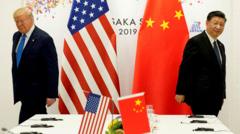In a significant political move, Hungary announced its withdrawal from the International Criminal Court (ICC) on the same day Israeli Prime Minister Benjamin Netanyahu visited the country. This decision, influenced by an ongoing ICC arrest warrant against Netanyahu for alleged war crimes, highlights Hungary's alignment with Israel amidst rising tensions over international legal norms.
Hungary's Controversial Withdrawal from ICC Coincides with Netanyahu Visit

Hungary's Controversial Withdrawal from ICC Coincides with Netanyahu Visit
Hungary's departure from the International Criminal Court is noted just as Israeli PM Netanyahu arrives, raising questions about justice and diplomacy.
Hungary has officially withdrawn from the International Criminal Court (ICC), a decision announced just hours after Israeli Prime Minister Benjamin Netanyahu, who is currently under an ICC arrest warrant, arrived in the country for a state visit. A senior official in Prime Minister Viktor Orban's administration confirmed the withdrawal, which marks Hungary as the first European Union nation to exit the ICC.
This move came after ICC judges identified "reasonable grounds" for believing Netanyahu holds "criminal responsibility" for alleged war crimes and crimes against humanity during his military operations in Gaza. Netanyahu, who regards the ICC's warrant as "antisemitic," proclaimed Hungary's decision as "bold and principled," reinforcing his government's stance against what they deem as a politically motivated legal system.
The ICC, established to prosecute serious international crimes such as genocide and war crimes, has been a notable part of the global legal landscape, with 125 member states. Despite Hungary's withdrawal, the operational capacity and legal framework of the ICC will remain largely unaffected. However, this shift raises concerns about the implications for international justice, leading some observers to speculate that other nations may reconsider their commitments to the court based on political factors.
During their joint press briefing, Prime Minister Orban described the ICC as a "political court," indicating a growing discontent with international institutions that he believes infringe upon national sovereignty. Netanyahu referenced discussions with U.S. President Donald Trump regarding future steps to challenge the ICC’s authority, while Hungary’s Defense Minister warmly welcomed Netanyahu upon his arrival.
The withdrawal from the ICC necessitates Hungary to formally notify the United Nations Secretary-General, a process that will take full effect one year after notification, as outlined in the Rome Statute. ICC spokesman Fadi El-Abdullah reiterated the court's expectation for Hungary to uphold its obligations to cooperate, despite the political fallout from this decision.
As the visit unfolded amidst escalating violence in Gaza following recent military actions, the international community remained divided on the implications of Hungary's stance, with Germany's Foreign Minister decrying the withdrawal as detrimental to international criminal law. The ongoing fallout from Israel’s military campaign against Hamas persists, highlighting broader geopolitical concerns surrounding accountability and justice in conflict situations.





















